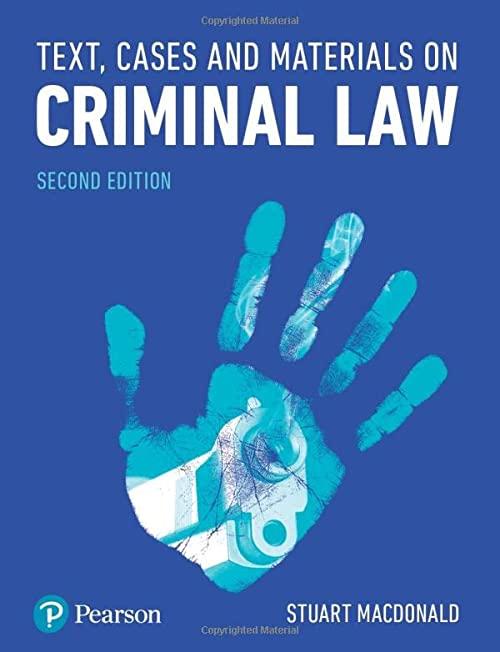Question
Questions 1-2 . From the textbook chapter Intro: 1. Many people argue for 'full disclosure' on the grounds of respect for autonomy. When physicians deceive
Questions 1-2. From the textbook chapter Intro:
1. Many people argue for 'full disclosure' on the grounds of respect for autonomy. "When physicians deceive a patient, they fail to respect his autonomy by constraining his ability to make informed choices. They compel him to make important decisions in a fog of distorted or missing information" (pg. 146).
How does this argument fit with Kant's concept of the categorical imperative? In other words, would Kant agree or disagree with this argument, and why?
2. From the 'classic case file' of Carlos R.: Do you agree with the commentator who advocates violating confidentiality, or the commentator who does not? Give reasons for your judgment in this case.
Questions 3-4 From Baillie excerpt on truthfulness:
3. Explain
the difference between a falsehood and a lie, according to Baille, et al.
4. According to Baille, it is not a lie to conceal the truth. If someone is demanding to know the whereabouts of your friend because this person wants to hurt your friend, it would be virtuous of you to conceal the truth in order to avoid an evil. The person wishing to hurt your friend does not have a right to know the truth. Give a healthcare example in which it would be morally permissible to conceal the truth because the person asking for the information does not have the right to know the truth.
Questions 5-9 From Tarasoff v. Regents of the University of California:
5. Professor Robertson points out the two legal questions central to the Tarasoff case with respect to duty. (2:40) Which of the five major bioethical principles do you think intersect with these legal duties?
6. (To answer questions A, B, and C, you'll need to understand Professor Robertson's explanation of nonfeasance, misfeasance, and of course, the moral principles we've covered so far.)
A. Consider scenario #1: Dr. Smith owns a multi-million dollar home but never gives to charity. Is she legally liable for the children in third world countries who die of starvation? Why or why not? Is she morally liable? Why or why not?
B. Consider scenario #2: Dr. Jones does not report a case involving a patient who threatens to kill her husband in his sleep. The patient never acts on her threat, but Dr. Jones' failure to warn the husband imposes legal liability. Why?
C. Misfeasance is a general duty that everyone has. We have a duty not to cause harm from unreasonable behavior. But generally, we do not have a legal duty to perform positive actions to protect others (nonfeasance). And yet, it seems that there are examples of times when omission (failure to act) warrants moral disapproval. Give an example of an omission that wouldnot impose legal culpability butwould impose moral culpability.
7. Explain how Professor Robertson uses Mill's harm principle to weigh patient's interests in privacy when it comes to the question of how to resolve the conflict between the duty of confidentiality and the duty to protect third parties. (23:40)
8. Why does Professor Robertson refer to societal interest in greater risk of violence (if patients are unable to secure candor and trust with therapists) as 'consequentialist' interests? What is his argument for resolving these interests? (25:00)
9. The Court's ruling in the Tarasoff case is based, in part, on utilitarian considerations. "The protective privilege ends where the public peril begins" (p. 195). Explain why their decision is utilitarian.
Step by Step Solution
There are 3 Steps involved in it
Step: 1

Get Instant Access to Expert-Tailored Solutions
See step-by-step solutions with expert insights and AI powered tools for academic success
Step: 2

Step: 3

Ace Your Homework with AI
Get the answers you need in no time with our AI-driven, step-by-step assistance
Get Started


